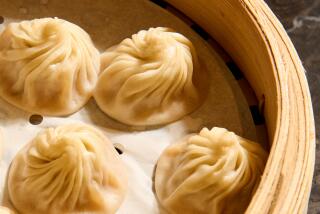INTERNATIONAL CAREERS : A World of Opportunity : Family Businesses Reap Dividends Borne of Long Hours, Dedication : Teamwork turns Dai Cheong Trading Co. into a thriving international import-export enterprise.
- Share via
International business sounds glamorous. Lots of travel. Wining and dining clients. Big bucks.
*
Keep it in the family and you’ll make even more. Plus no answering to big corporate types. Freedom to come and go as you please so long as the work gets done. Quality time with family members on the job.
The truth is a lot less glamorous. Running a family international business requires hard work, total dedication and family members who are willing to work together day and night for the good of the company. But it can also yield ample rewards.
Consider Dai Cheong Trading Co., a family import-export firm based in an industrial section of Lincoln Park. When Douglas and Pauline Shin and her father, Cheong Wong, started their family business 14 years ago, they had four employees in a small warehouse near Downtown Los Angeles.
Today Dai Cheong imports about 35 containers of food products from Asia each month and ships back even more from its 50,000-square-foot facility employing more than 20 people. Recently the firm received a $3-million contract to deliver chairs and wood flooring for a sports stadium in China.
Dai Cheong provides a good example of a family succeeding at international business.
The first important thing this Chinese family from Vietnam did was to make sure there was a market for the products it wanted to import. In the late 1970s, Cheong Wong and his family realized it was hard to find their favorite foods from Asia here in Southern California.
Within a few years, record numbers of Chinese immigrants had settled in Southern California. Many missed the rice noodles, bamboo shoots, cookies and oyster sauces they knew from home.
Dai Cheong was able to get in on the ground floor and watch its business boom right alongside the population.
“There was a window of opportunity for us,” Pauline Shin recalls. “There wasn’t much competition.”
The family also drew on previous business experience--another common denominator of successful entrepreneurs. Douglas Shin had worked at Asian grocery stores and knew how to order in bulk, price individual goods, ship and distribute--all skills he applied to Dai Cheong.
Likewise, the Shins took advantage of old family connections thanks to Pauline Shin’s father, a well-known businessman who had run an import-export company called Dai Cheong (which means big Cheong) in Saigon until South Vietnam fell to the Communists.
“We wrote to suppliers and asked for exclusive rights to distribute their products,” Pauline Shin said. “Through my father, we had old friends in Asia. Uncles and aunties who were in manufacturing. They helped us.”
In addition to good planning, merchant skills and familiarity with the market they were trying to reach, the owners of Dai Cheong also had good guanxi --a Chinese word best translated as “personal connections”--that allowed them to do business in Asia.
But the same would be true for any international family business whose members could, say, call on contacts back home to buy and ship Mexican furniture, Armenian cognac or African leather products. The trick is realizing that in many parts of the world, smart business deals aren’t cemented by paper contracts that can’t be enforced but by informal relationships of trust and mutual obligation.
But even successful family businesses often find their sales plateauing after several years. Dai Cheong realized that early on, so company President David Wong--Pauline Shin’s brother--began traveling through the Pacific Rim, meeting with prospective clients and wheeling and dealing to buy and sell American goods in Hong Kong, China, Thailand and elsewhere in Asia.
Recently Wong landed a contract to provide plastic chairs and hardwood flooring for a sports stadium in China’s Guangdong province. The firm also exports self-help books and comics to Hong Kong and ships minimum 50,000-ton orders of corn oil, sugar, flour and creamed corn to China, where many staples are in short supply.
To handle the business, Dai Cheong added a Hong Kong office in 1986 and a branch in Thailand in 1983. Today it is poised to move into Vietnam as that nation opens up for trade.
Peer into a successful family business and you’ll usually find a diversified employee base. The one with math aptitude might keep the books. The gregarious one could be tapped as the salesperson. A third might be the best negotiator.
The family behind Dai Cheong is no exception. When Wong got the contract for the chairs, the family brain trust sprang into action. Shin’s younger brother, a civil engineer, drew up blueprints. The Shins visited trade shows to learn all about the industry and gather price quotes. They also commissioned samples, which were shipped to China for inspection.
“We taught ourselves,” Douglas Shin recalls proudly.
It’s an old axiom that small family businesses call for long hours and dedication, and it is even more true when the business is international and transacted across datelines.
Douglas Shin arrives to work before 8 a.m. and stays until after 9 p.m. to talk to his suppliers in Asia, where the next business day has already started. His wife has to leave earlier to pick up the children at day care.
“There’s not enough time, but what can I do?” Pauline Shin says. “Having a family business makes you nervous. But when you succeed, it feels good. You’re satisfied.”
More to Read
Inside the business of entertainment
The Wide Shot brings you news, analysis and insights on everything from streaming wars to production — and what it all means for the future.
You may occasionally receive promotional content from the Los Angeles Times.










